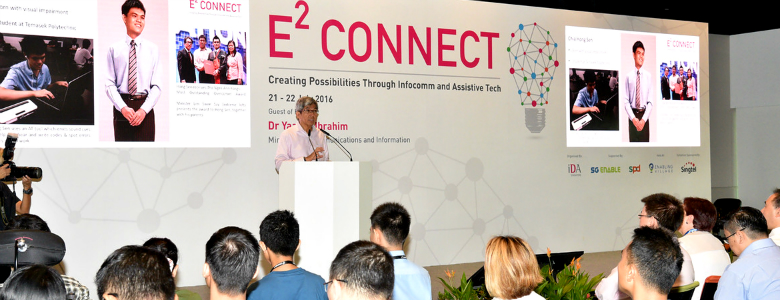Assistive tech: An enabling force

More people with disabilities, students from low-income families and Voluntary Welfare Organisations (VWOs) will have easier access to computers, smart gadgets and broadband connectivity, allowing them to tap the benefits of assistive technology.
Dr Yaacob Ibrahim, Minister for Communications and Information announced this at the inaugural E2Connect 2016 forum, which aimed to raise awareness of various Infocomm and Assistive Technologies (IT/AT) available today which can help address many of the challenges that people with disabilities face in their daily lives.
“As policy-makers, our role is to provide the infrastructure and policies to create a more inclusive environment. This means finding ways in which technology can help to improve our processes and services, making technology accessible to those who need it and ensuring that persons with disabilities can afford devices that suit their needs,” he said.
Under the enhanced NEU PC Plus programme, the monthly income cap will be raised from $3,000 to $3,400 from September 1.
Some 5,000 additional families are expected to benefit from this change over the next five years. Additionally, the application processes will be streamlined so that special education students already on financial assistance will be able to receive subsidies of up to 75 per cent more easily.
Since the programme was launched in 2006, more than 27,000 households with school-going children or people with disabilities have benefitted from this scheme.
One beneficiary is Mr Leonard Wong, 20, who was able to get a laptop for just $330. “Without it, I would have to stay back in school and use the computers in school when they are available,” he said. “I’m glad the scheme has been expanded to help more people.”
In another move to help persons with disabilities familiarise themselves with various assistive technology devices and applications, the Infocomm Development Authority of Singapore (IDA) has launched a Lab on Wheels bus which features various assistive tech gadgets to help those with special needs.
Partnering with SG Enable, an agency dedicated to helping people with physical or intellectual disabilities, IDA said the bus will help bring the benefits of technology to the doorstep of Singapore’s special needs community.
It will also help students, caregivers and the general public to better appreciate the needs of this community.
Assistive Tech here to help
Among the IT/AT devices on display in the wheelchair-accessible bus was an IT/AT software app helps the visually-impaired recognise various currencies, text-to-speech software, large typeface keyboards, digital image magnifiers and auditory aids.
Six VWOs have also received IT/AT adaptation grants for relevant assistive technology skills and equipment to help their clients.
Some VWOs have noted that those with special needs tend to lose interest in traditional paper-based activities because of lack of stimulation.
The Blue Cross Thong Kheng Home, which provides shelter and care to healthy adults with disabilities, was one of the VWOs which received the IT/AT grant.
It has started using smart interactive whiteboards and special apps on tablets to keep their clients engaged in the rehabilitation process.
SPD, another VWO which serves people with physical disabilities, has incorporated virtual reality and sensory stimulation solutions at its day activity centre.
“We strongly believe that such technology can enable and empower persons with disabilities in their daily lives. Being an inclusive and a truly Smart Nation means that we not only have to stay ahead of the curve, but also bridge the gaps to ensure that no one is left behind,” said Minister Yaacob.
The two-day E2Connect 2016 forum was held at the Enabling Village in Lengkok Bahru.
It brought together many educators, therapists, healthcare professionals, employers and academics to discuss the positive impact technology has in the lives of people with disabilities and the various IT/AT solutions available and learn from the experiences in other countries.
Speakers included Mr John Kemp, President and Chief Executive Officer of The Viscardi Center in New York; Ms Robyn Chapman, Chief Executive Officer of the Independent Living Centre NSW, in Sydney; and Mr Greg Alchin, Apple-certified Accessibility Consultant.


